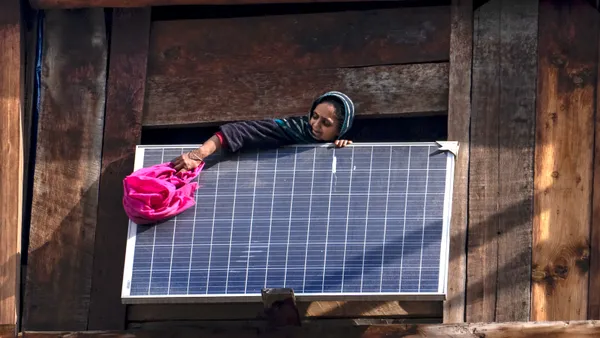Dive Brief:
- The Integrity Council for the Voluntary Carbon Market will not allow carbon credits issued under current methodologies used to develop renewable energy projects to be certified with its Core Carbon Principles label, the organization announced Tuesday.
- The carbon market governing body said eight renewable energy methodologies were “insufficiently rigorous” in evaluating whether projects could have proceeded without carbon credit revenue incentives and failed to meet the label’s assessment framework requirements.
- ICVCM, whose label seeks to set a global quality benchmark in the voluntary carbon market, said carbon credits issued under these existing methodologies make up 32% of the market and cover around 236 million unretired or unused credits. However, the organization approved only 27 million unretired credits — 3.6% of the market — to use its CCP label in its latest assessment.
Dive Insight:
The governing body said its CCP label is “designed to build trust in the voluntary carbon market,” guarantee credit comparability and allow the market to unlock its potential to curb increasing greenhouse gas emissions and provide private funding for climate solutions. The label also gives assurance that each credit is representative of a metric tonne of emissions that have been reduced or removed from the atmosphere, per the organization.
To qualify for the organization’s CCP label, carbon credits undergo a rigorous evaluation process based on ICVCM’s ten core principles. These principles are categorized under “governance,” “emissions impact,” and “sustainable development,” and include determinants such as transparency, permanence, robust quantification and contribution to a net-zero pathway.
The label helps buyers differentiate carbon credits that represent “real and verifiable climate impact” and support sustainable development goals, per ICVCM.
“We are taking the tough decisions necessary to build a high-integrity voluntary carbon market that can be scaled to meaningfully fund climate solutions and channel material amounts of finance to the Global South,” ICVCM Chair Annette Nazareth said in a release. “While companies’ first priority must always be to decarbonize their own value chains, carbon credits can be an important supplement, allowing them to go further and take responsibility for emissions they cannot yet cut.”
Other than buttoning up its standards for issuing high-integrity labels, the organization said it has approved a crediting methodology which is used in lower income countries with poor infrastructure for projects that detect and repair methane leaks in the gas industry. The methodology covers around 19 million unused carbon credits from projects in Bangladesh, making up 2.6% of the market. The organization also rejected a methodology for projects in the magnesium industry targeting the reduction of sulfur hexafluoride as it did not meet its assessment requirements. Carbon credits using this methodology represent a relatively small figure, according to ICVCM.
The update comes as the voluntary carbon market is facing heightened scrutiny over its effectiveness in reducing carbon emissions.
Last month, a group of over 80 organizations focused on environmental and social issues argued that allowing entities to meet climate commitments through carbon credits is “likely to slow down global emission reductions.” The organizations expressed concern over the growing push to utilize carbon credits to offset emissions and said this reliance reduces the scale of funding and urgency needed to develop systems that hold emission-intensive sectors accountable and assist regions disproportionately impacted by climate change, such as the Global South.
Shortly after, the Science Based Targets initiative released a report corroborating those concerns and found there are “clear risks” to using carbon credits to offset emissions.











